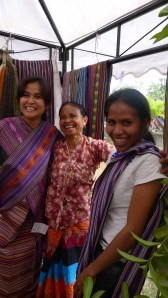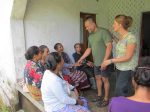Apologies for the long silence; this month has been exceptionally busy. I’ve been writing this entry off and on for three weeks so it’s a rather long account of what we’ve been up to in April….floods, borders, donations, funerals, ceremonies, holidays, meetings, visitors, debacles, successes … you name it!
We made a trip from Lospalos to Dili to transport goods from Rotary for CTKDS and soon after, made a mad rush across the border to West Timor to buy cotton. We’ve had various planning meetings and a visit from lovely Rosie, an Irish journalist. The youngest child of the family to my right passed away late last month, alone in the Dili national hospital after a long illness that no one really understands and then the ensuing week of mourning. Neighbours to my left searched for and buried their son’s remains- a Falintil fighter- and then had an intense political and cultural ceremonies surrounding such an important event. There are funerals almost every weekend.
The two most memorable experiences of April were participating in much of the five-day cultural ceremony for the returning of the Falintil fighter’s bones and the visit to Betun and Kefamenanu in Indonesia, which was amazing. In my last post I spoke about research and the right to information, particularly in the context of the cultural processes surrounding the returning of the remains of loved ones killed during the resistance. Fortunately, my colleagues had spoken to Pedro’s family (the Falintil fighter whose bones were returned in late March) and they’re keen to have their story told. By coincidence, when we went to West Timor, Acasio, Pedro’s younger brother was our guide and host so I got to spend hours talking with him. Acasio and his wife’s family fled to West Timor during the militia violence in 1999 and have since established a community with one hundred other Timorese refugee families, complete with roads, running water, a cemetery and a school in a village called Numponi in the mountainous region of Betun. Acasio graciously gave me two hours of his time and told me about the process of bringing his brother’s bones home and its importance to the family and to their culture; and also the trauma and sense of relief that due to the ceremony, his brother’s soul is now free to return to Mount Matebian, the spirit mountain, with his ancestors.
Pedro was shot by the Indonesian military near Baguia in 1978 and his body was taken to the family’s camp on Mt Matebian where they had fled along with thousands of other Timorese families. Pedro died three days later and was buried near the camp. Consequently, late last month, Acasio and his uncles found the grave relatively quickly considering the landscape had changed dramatically in the last three decades. The search lasted for 18hours. He said there were times when it felt helpless. Heavy rain, the track concealed and overgrown with weeds and in places landslides rendered the path unrecognisable. An elder familiar with the right prayers accompanied them and undertook particular Adat (sacred process) ceremonies along the way to unlock the path to Pedro’s grave. Once his grave was found, another Adat ceremony took place then his remains were wrapped in Tais and carried back to Lospalos to his grieving family.
I was at the house at that moment. It was impossible not to feel what the family was feeling, particularly Pedro’s mother who last year went through the same process for her husband. Relief, grief, freedom, suffering, loss, desolation … all these emotions bound together in the women’s falling tears. This seemed a very private moment for the family and the community. I felt like an intruder so tried to hide my tears of empathy. But Elsa reminded me that I had been invited and welcomed by the family so I felt blessed but still embarrassed. I can’t begin to identify with all that has happened to shape these people, their culture; their strength and determination and their strong sense of nationalism and pride but at the moment the mother held the bones of her long-dead son, her head shrouded in a cloth to hide her despair, I got a sense of how deep the sorrow goes. This is something every mother the world over would feel.
The trip to Indonesia was wonderful. Arriving on Saturday; Acasio and his children met us at the border in their little ramshackle Microlet. We took our time to get to Betun and his family welcomed us with open arms when we arrived. On Sunday, we took a leisurely drive through lush forest to Kefamenanu to visit a very professional community business to purchase cotton. This is a very exciting part of my work with CTKDS weavers as their enthusiasm about cotton is infectious! It’s wonderful to see how other textile projects work, this one in particular as Kefa is quite remote and the project has been going for almost a decade. It’s also an interesting place with a large recently refurbished Catholic Church and shabby shopping strip nestled in a massive forest. Many people in that part West Timor speak Tetun and the tais are very similar to those produced in Lospalos by the Fataluku people. We arrived back at Acasio’s late in the evening, drank a little local tua sabu and watched music videos made by one of his nephews- pretty cool!
So… now it’s Saturday and I’m back in Lospalos after a few days break in Bali with Clinton over Easter. Re-reading what I wrote a couple of weeks back, I appreciate just how demanding the last few weeks have been.
But wait there’s more!!
Massive floods in Lautem last week washed away one of the larger bridges so we had to wait until Monday to try and get through, keeping in mind my flight to come here to Bali left the following morning. The land-side of the bridge was impassable as it had become a massive bog so we waited a few hours for the tide to go out and crossed the river on the sea-side. Once through, my 4WD wouldn’t disengage so Alex and my ex-driver Nono (sob sob) came to the rescue. By the time the car was fixed, it was too late to travel to Dili so we went back to Lospalos. I was hungry, tired, frustrated and pretty worried about missing my flight. I contacted Jose (my life-line in Dili) and the next morning Maleve flew me – on his motorbike – to Baucau and Juve raced to the airport with just twenty minutes to spare before my plane took off. PHEW!
So I really do feel my Bali trip was a well-deserved break although I missed everyone in Lospalos terribly. There are many lessons from Ubud for Timor about tourism, service delivery, art and its presentation, living with the environment etc, etc. Not so sure about Kuta though- that’s a what-not-to-do-lesson methinks. I hope we can organize an exposure tour for some CTKDS members to Ubud soon as I’m sure the sensory overload here would spark their imagination! We visited Threads of Life, something I’ve wanted to do for years- amazing, amazing place; a gallery of traditional textiles from across the archipelago and the living stories of the weavers and their culture.
Until next time… selamat jalan!




